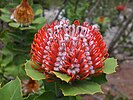Wikipedia:Today's featured article/September 11, 2016
Banksia coccinea, commonly known as the scarlet banksia, is an erect shrub or small tree in the family Proteaceae. It grows along the southern coast of Western Australia on white or grey sand in shrubland, heath or open woodland. Reaching up to 8 m (26 ft) in height, it is a single-stemmed plant with oblong leaves. The prominent red and white flower spikes appear mainly in the spring. As they age they develop small follicles that store seeds until opened by bushfire. Though widely occurring, it is highly sensitive to dieback, and large populations of plants have succumbed to the disease. It was first collected and described by Robert Brown in the early 19th century. The flowers attract nectar- and insect-feeding birds, particularly honeyeaters, and a variety of insects. A popular garden plant and one of the most important Banksia species for the cut flower industry, it is grown commercially in Australia, South Africa, Canada, the United States, New Zealand and Israel. In cultivation, it grows well in a sunny location on well-drained soil, but cannot survive in areas with humid or wet summers. (Full article...)

